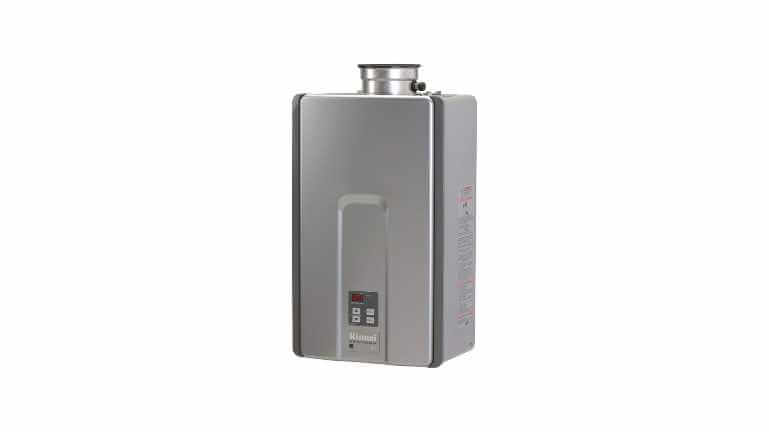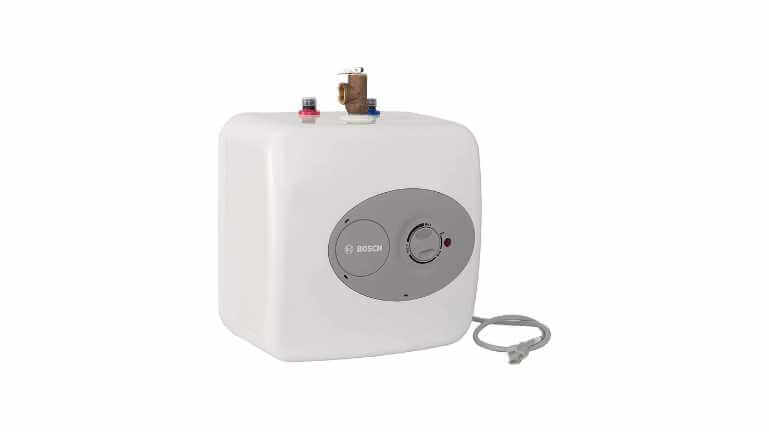When it comes to home comfort, nothing beats stepping into a hot shower on a chilly morning or soaking in a steamy bath after a long day. But who is the unsung hero behind these simple pleasures? Your water heater. Choosing the best water heater for your home is not just about comfort; it’s about embracing efficiency, reliability, and innovation. In this guide, we’ll dive into the world of water heaters, exploring the top models that promise to keep your life warm and your bills cool. Stay tuned as we turn up the heat and unveil the champions of hot water solutions!
EcoSmart ECO 11 Electric Tankless Water Heater

Compact yet powerful, the EcoSmart ECO 11 Electric Tankless Water Heater revolutionizes your hot water experience. With its sleek design and LED display, it saves space while providing endless on-demand hot water, ensuring consistent performance within a single degree of your selected temperature. At 8 inches wide and 11.5 inches high, this 13-kilowatt wonder is 90% smaller than traditional tank heaters, fitting seamlessly into any space.
Crafted for efficiency, it heats water only when needed, saving energy and money. Ideal for bathrooms, small sinks, or office breakrooms, it delivers between 1.3 and 3.1 gallons per minute, adapting to your needs. Say goodbye to wasted energy and hello to uninterrupted comfort with the EcoSmart ECO 11 Electric Tankless Water Heater.
Pros:
- Endless, on-demand hot water
- Consistent temperature within 1 degree
- 90% smaller than traditional tank heaters
- 99% thermal energy efficiency
- LED display for easy control
- Ideal for point-of-use applications
- Energy-efficient operation
Cons:
- Limited capacity (2 gallons)
- Requires a 54A amperage draw
Rinnai RL Series HE+ Tankless Hot Water Heater

Elevate your home with the Rinnai RL Series HE+ Tankless Hot Water Heater. Compact yet powerful, this gas-powered unit delivers up to 7.5 gallons per minute, ensuring you never run out of hot water. Its Circ-Logic technology adapts to your usage patterns, while its smart, durable design comes with extensive residential and commercial warranties for peace of mind. Professional installation is recommended for optimal performance.
Measuring 17.5 inches wide by 31 inches high, this tankless water heater is a space-saving solution for any home. With its sleek gray exterior and metal construction, it’s built to last. Explore Rinnai’s range of product guides and manuals to find the perfect fit for your household’s needs.
Pros:
- Compact design, space-saving
- Circ-Logic technology for personalized recirculation
- Provides up to 7.5 GPM for simultaneous use
- Durable metal construction
- Long warranty period (12 years residential, 5 years commercial)
- Control module for WiFi control (not included)
Cons:
- Professional installation recommended
- WiFi control module not included
Bosch Electric Mini-Tank Water Heater

Compact yet powerful, the Bosch Electric Mini-Tank Water Heater delivers instant hot water with efficiency and ease. At 13.75 inches in width and height, this lightweight heater fits snugly under your sink, ensuring hot water is readily available where you need it most. Crafted with premium glass-lined material, its durability promises a long service life, while its 2.5-gallon capacity ensures a steady supply.
Installation is a breeze with its independent setup, plugging effortlessly into a 120-volt outlet or inline with a larger hot water source. With a fast recovery rate, it eliminates tedious waits for hot water, serving up to two sinks simultaneously. Whether mounted on a shelf, wall, or floor, this versatile water heater is the perfect solution for homes, garages, offices, or anywhere instant hot water is essential.
Pros:
- Compact and space-saving design
- The fast recovery rate for instant hot water
- Premium glass-lined material for durability
- Lightweight at 15.5 pounds
- Versatile installation options (shelf, wall, floor)
Cons:
- Limited 2.5-gallon capacity
- Requires access to a 120-volt outlet
- May not be suitable for high-demand hot water needs
Best Water Heaters For Home Buying Guide
Having hot water available whenever you need it is essential for any home. Choosing the right water heater for your home’s needs and budget can seem overwhelming with all the different types and options available. This guide will walk you through the key factors to consider when selecting the best water heater for your home.
Types of Water Heaters
There are several main types of water heaters to choose from. Understanding the pros and cons of each will help narrow down what is best suited for your home.
Tank Water Heaters
Tank water heaters are the most common type of water heater found in homes. They consist of an insulated tank that keeps water hot until needed. Tank water heaters come in gas, electric, oil, and propane fuel types. They provide reliable hot water at all times. The main downsides are that they take up more space, and energy tends to be lost keeping the full volume of water in the tank hot when not in use.
Tankless Water Heaters
Tankless or on-demand water heaters instantly heat water as it flows through the unit. This results in unlimited hot water on demand. Tankless models do not store heated water, so they save space and can use less energy by not maintaining a full tank of hot water at all times. The tradeoff is their limitation on water flow rate and the need for higher-powered gas or electric connections to heat water fast enough.
Hybrid Water Heaters
Hybrid water heaters combine elements of both tank and tankless models. They have a tank for storing some pre-heated water while also having an on-demand heat component for times of greater hot water demand. This allows for energy efficiency with tankless benefits without limiting water flow rates.
Key Factors to Consider
With the main types of water heaters understood, here are some of the most important factors and questions to weigh when selecting the right model.
Fuel Type
The fuel options for water heaters include natural gas, propane, electricity, or even solar power. Consider what energy sources are available or preferred to fuel the water heater in your home. Gas types provide greater efficiency and faster heating in most cases.
Size and First-Hour Rating
Make sure to choose a unit properly sized for your household needs based on the number of bedrooms, bathrooms, and habits around hot water usage. Models list their first-hour rating, indicating how much hot water in gallons can be provided within the first hour of use before additional heating time is needed.
Energy Efficiency
Look at the Energy Factor (EF) rating to compare options based on overall efficiency and cost of operation. The higher the EF, the more efficient the unit is. Choosing a higher-efficiency model can provide significant long-term cost savings.
Installation Needs
Factor in whether the model must go in a basement, garage, or even outdoors. Consider any needed ventilation requirements. And be sure it will fit the available installation space. Professional installation is recommended for safety, updated codes, and warranty requirements.
Price
Of course, budget plays a role in any major home purchase decision. Compare the upfront costs, long-term operating costs, and well-expected lifetimes of different units. Avoid choosing only based on the lowest upfront price at the expense of other key factors listed above.
Warranties
It is important to consider and compare the warranties offered on tanks, parts, and labor. Longer warranties provide greater protection and indicate expected longevity and durability.
Conclusion
Choosing a new water heater for your home is an important decision, taking into account your household’s hot water needs, fuel type available, installation space, and budget. Taking the time to weigh the types of heaters along with key factors like energy efficiency, size, and warranties will help ensure you select the right one for your home. With improved designs and longer-lasting components, today’s water heaters can provide reliable hot water for many years when the model best suited to your needs is properly selected and installed.
Frequently Asked Question
What type of water heater is best suited for my home?
The best type of water heater for your home depends on various factors, such as your budget, energy source availability, and space constraints. Tankless water heaters are efficient and space-saving, while traditional tank-style heaters are more budget-friendly upfront. Heat pump water heaters are environmentally friendly but may require more space.
How do I determine the right size water heater for my household?
The size of your water heater depends on the number of people in your household and your hot water usage habits. As a general rule, multiply the number of people in your home by 15-20 gallons to estimate the tank size needed. However, for tankless water heaters, consider the flow rate and temperature rise required for your household’s simultaneous hot water needs.
What are the energy efficiency ratings I should look for in a water heater?
Look for water heaters with high Energy Factor (EF) ratings, which indicate their energy efficiency. For electric tank-style water heaters, consider models with EF ratings above 0.90. For gas tank-style heaters, look for EF ratings above 0.60. Tankless water heaters are inherently more energy-efficient, but check for Energy Star certification and high Uniform Energy Factor (UEF) ratings.
How often should I perform maintenance on my water heater?
Regular maintenance helps prolong the lifespan and efficiency of your water heater. Inspect the pressure relief valve annually, and flush the tank every 6–12 months to remove sediment buildup. Check for leaks and ensure proper insulation around the tank and pipes. If you have a tankless water heater, consult the manufacturer’s recommendations for flushing intervals and other maintenance tasks.
What factors should I consider when choosing between gas and electric water heaters?
Consider factors such as energy costs in your area, availability of energy sources, upfront costs, and maintenance requirements. Gas water heaters typically have lower operating costs but may require ventilation and have higher upfront installation costs. Electric water heaters are simpler to install and have lower upfront costs, but they may be more expensive to operate depending on the electricity rates in your area.

Ross Walters, an Electrical supplies and Water Appliances specialist, shares his extensive expertise on top platforms. With a focus on empowering professionals and enthusiasts, Ross delivers up-to-date insights and practical advice. His commitment to staying abreast of industry trends establishes him as a trusted source for navigating the complexities of electrical systems and water appliances.
